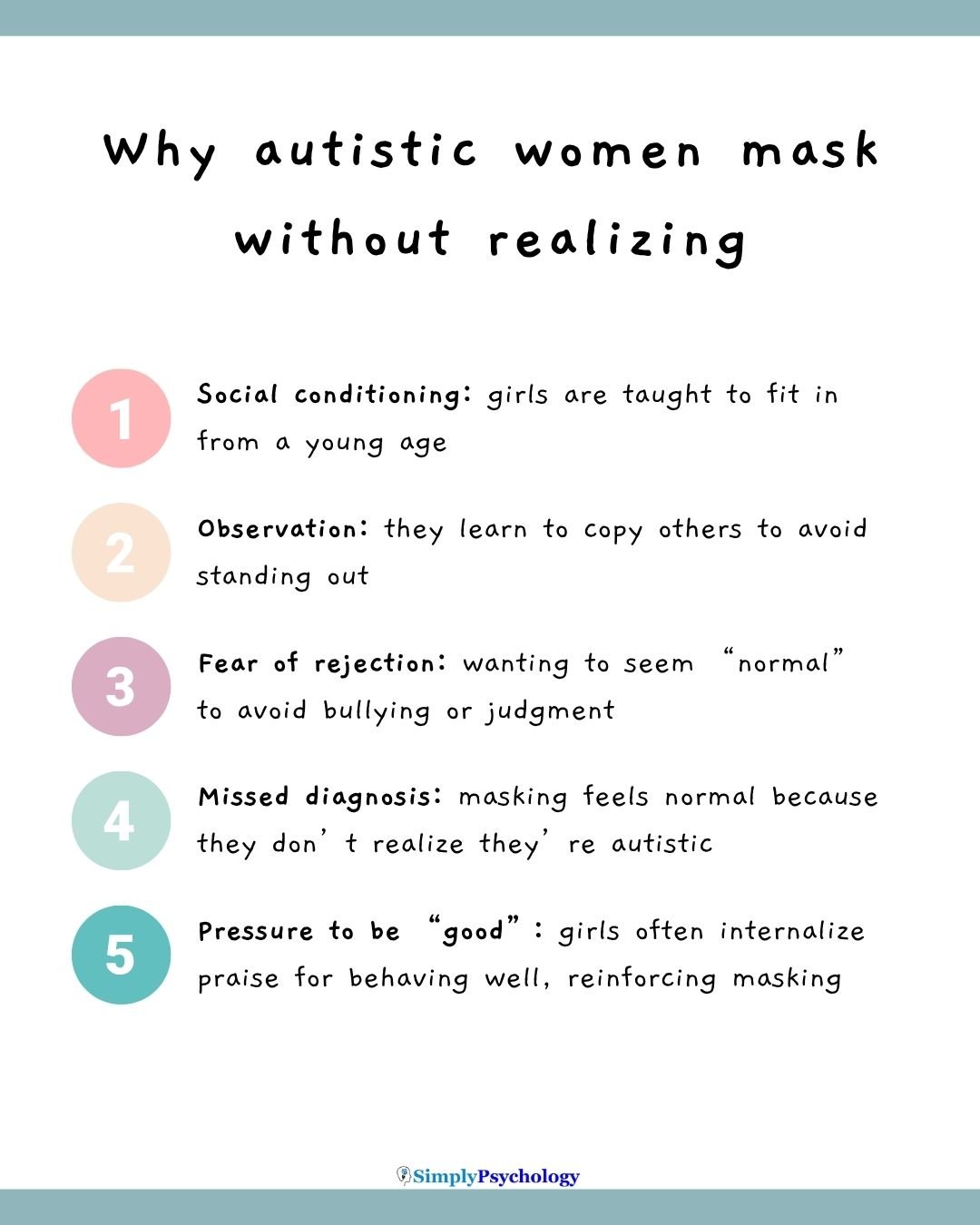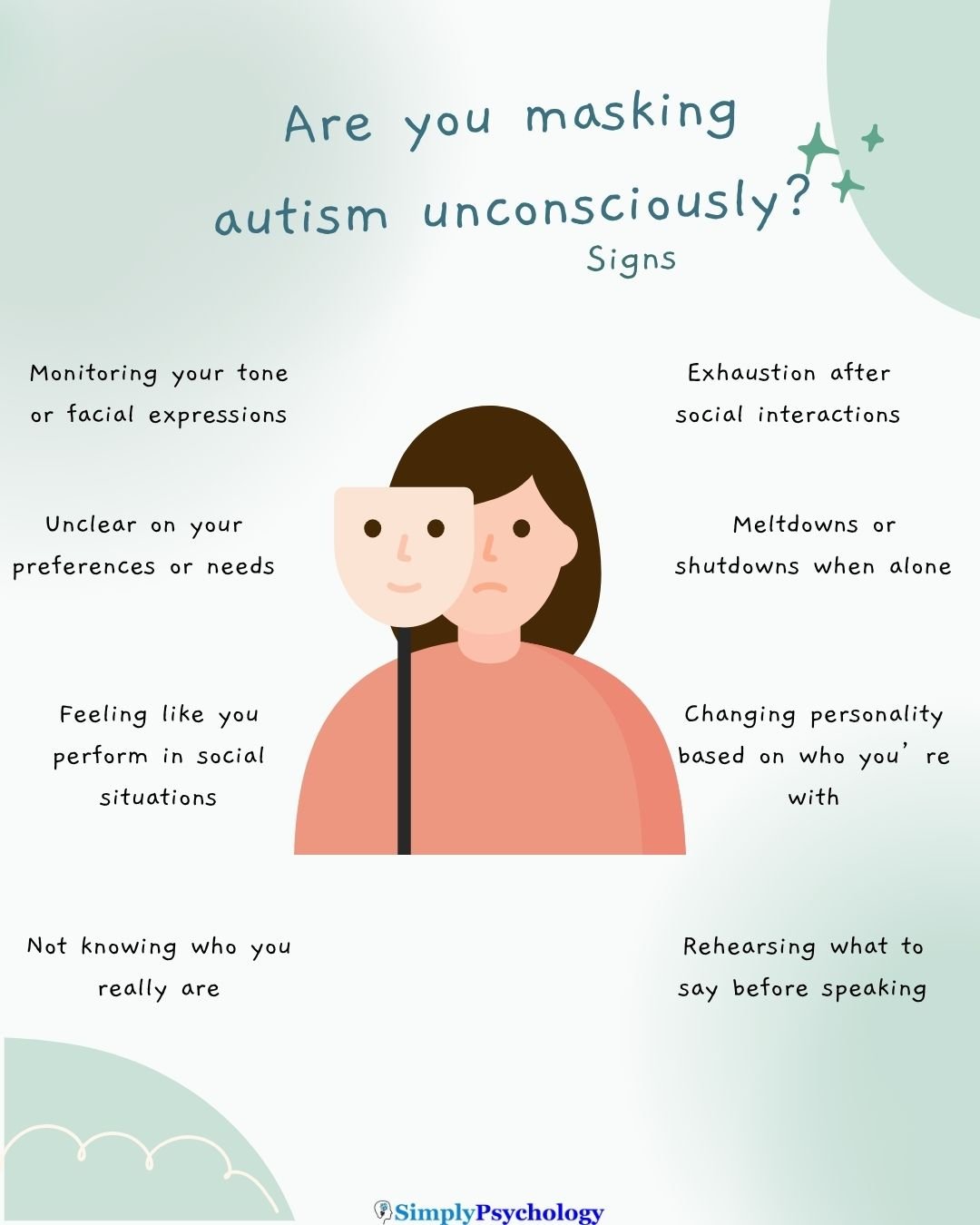Many autistic women do mask their autism without even realizing it. In fact, “masking” – also known as camouflaging or pretending to be neurotypical – can be an unconscious behavior that autistic people learn over time.
This means an autistic woman might hide her autistic traits and mimic neurotypical behavior automatically, without deliberately choosing to do so.

Understanding Masking in Autism
Masking in autism refers to adopting strategies to “appear non-autistic” in social situations.
Autistic individuals who mask often suppress natural behaviors (like stimming or avoiding eye contact) and imitate the social behaviors of neurotypical people in order to blend in.
In other words, some autistic people learn to hide their true selves behind a socially acceptable “mask.”
Importantly, masking isn’t always a conscious act. It can become second nature or subconscious.
For example, many late-diagnosed autistic adults realize they’ve been camouflaging their autism for years without knowing it.
One autistic man described that “before I realised I was on the spectrum, masking was just called coping. It was just called fitting in and having friends and keeping a job…”
This shows how an autistic person can grow up automatically adapting to social expectations, not realizing they are in effect masking their autistic traits.
Why Autistic Women Often Mask Unconsciously
Research and clinical experience suggest that autistic women and girls are especially likely to mask, often starting in childhood.
In fact, autistic women (and many non-binary individuals) appear more likely to mask their autism traits than autistic men.
There are a few key reasons for this gender difference:
Social Expectations and “Fitting In”
Girls are often socialized to be more attuned to social norms. From a young age, autistic girls may receive the message that they must behave “appropriately” and not stand out.
They might imitate classmates’ mannerisms, force smiles, or rehearse correct responses. This imitation helps them “pass” as neurotypical for a while, especially in structured environments like school.
Learning by Observation
Autistic females often become keen observers of social behavior. They may study how peers interact or even learn social cues from movies and books.
Over time, these copied behaviors turn into an automatic repertoire. The autistic woman might not realize she is compensating for her differences – she just knows that copying others helps her avoid negative attention.
Later Diagnosis
Because girls are often better at camouflaging, many autistic women remain undiagnosed until adulthood.
They don’t fit the “stereotypical” male autism profile and thus fly under the radar. These women often spend years feeling like something is “wrong” with them, though they aren’t sure what.
In that time, they have usually adapted their behavior so well that masking becomes an ingrained habit.
By the time an autistic woman discovers her neurodivergence, she might reflect and realize that what she thought was “just coping” or “trying to fit in” was actually a lifelong act of camouflaging her true self.
Societal Pressures
Unfortunately, many autistic women report feeling pressure to hide their struggles to avoid stigma or bias.
They might worry about being judged as “weird” or face sexism that expects girls to be socially adept.
Family and teachers may unintentionally encourage masking (for example, praising a girl for behaving like her peers, or discouraging behaviors that seem odd). Over time, this external pressure is internalized.
As autism advocate Purple Ella describes, “Masking happens in the context of being given the message at quite a young age that who you are… is not okay, and that you will only be accepted if you shape yourself into something else.”
Autistic women often absorb this message and blend in at all costs – so automatically that they don’t realize how much effort they’re expending to seem “normal.”
Signs You May Be Masking Without Realizing It
Here are a few signs that might indicate you are masking your autism (even if you don’t think of it that way):

Constant Social Exhaustion
Do social interactions (even ones you enjoyed) leave you utterly drained?
Many autistic women feel they have to be “on stage” socially – consciously or not – which uses enormous energy.
Feeling wiped out or needing long recovery time after socializing can be a sign of hidden masking.
This social fatigue might be greater than what a neurotypical person experiences.
“Holding It Together” in Public, Crashing in Private
You might appear calm and composed at work or school, but collapse into tears, meltdowns, or shutdowns when you get home.
Autistic people who unconsciously mask often bottle up stress in public.
If you’ve ever been told “you’re so well-behaved at school!” while you feel completely different (overwhelmed or falling apart) at home, unconscious masking could be why.
Chameleon-like Personality Changes
You may notice you act differently around different people without intending to deceive anyone.
Perhaps you mimic the personality of whichever friend group you’re with, or you consciously adjust your tone and body language to match others.
For example, you might adopt your neurotypical friends’ slang, laugh when others laugh (even if you’re confused), or suppress your quirks to “match the room.”
If you find yourself constantly altering your behavior depending on the social setting, it may be an unconscious masking strategy.
Uncertain Sense of Self
After years of camouflaging, you might feel unsure who the “real you” is. Some autistic women describe a loss of identity or feeling like they only exist as a collection of masks for other people.
“I have lovely friends, who are very supportive… but it’s not me they like, they don’t know me at all – just the mask that I wear.”
If you relate to feeling that others only see a version of you and not your authentic self, this points to deep masking.
Anxiety and Perfectionism in Social Situations
Many autistic people who mask have intense social anxiety because they’re always analyzing how they’re perceived.
They may force eye contact, carefully control their facial expressions, and mentally script their small talk.
This vigilance can become so routine you don’t realize you’re doing it – you just know that socializing makes you anxious.
In hindsight, some late-diagnosed autistics realize their lifelong social anxiety came partly from the strain of masking and worrying they’d be “found out” as different.
The Impact of Prolonged Masking
Masking can help autistic women navigate social situations, but when it’s constant—especially without conscious awareness—it often comes at a personal cost.
Below are some of the most common consequences of prolonged masking:
Emotional and Mental Fatigue
Masking requires sustained mental effort. Psychologists have likened it to speaking a foreign language nonstop. Over time, this constant monitoring of behavior and self-presentation can lead to:
- Persistent exhaustion, even after short social interactions
- Autistic burnout, a state of physical and emotional depletion
- Emotional shutdowns or numbness
One autistic woman shared, “Even when I have a good time socially, I’m completely wiped out for the next two days. I didn’t realize I was ‘performing’ until I finally stopped.”
Anxiety and Depression
Masking is strongly associated with increased mental health challenges. Individuals who mask more frequently report higher levels of:
- Social anxiety and constant self-monitoring
- Depression linked to a feeling of being fundamentally different or broken
- Internalized shame around being “too much” or “not enough”
Identity Confusion and Imposter Syndrome
Years of masking can distort your sense of self. Many women wonder:
- Who am I when I’m not performing?
- Do people like the real me, or just the version I show them?
Professor Francesca Happé notes that masking can erode identity and self-esteem, especially when no one sees or validates your authentic self.
Long-Term Effects on Self-Worth
Unconscious masking can damage self-esteem over time. Many autistic women come to believe:
- They are only accepted when they hide who they are
- Authentic expression will lead to rejection
- Their real personality is flawed or unlikable
As one late-diagnosed woman put it, “I felt like such an evil, manipulative person because I wasn’t being authentic—but I didn’t even know I was masking.”
Moving Toward Authenticity and Support
If you discover that you’ve been masking without realizing it, you might feel a mix of relief and grief.
It can be validating to understand why you’ve always felt different or exhausted – “Oh, I was masking, and that’s why I struggled” – but also upsetting to think of the years spent hiding. Now that you know, you can work toward a healthier balance.
Here are some supportive steps and considerations:
Seek Safe Spaces
Find people and environments where you can “drop the mask” at least part of the time. This might be with close family, neurodivergent friends, or an autism support group.
Having even one context in which you don’t have to perform can greatly reduce stress. Many autistic women find comfort online (for example, in autism communities) where they can be frank about their experiences without fear of judgment.
Professional Guidance
Consider talking to a therapist (ideally one knowledgeable about autism) who can help you explore your authentic self and coping strategies.
They can assist with managing anxiety and unmasking gradually in a way that feels safe.
If you are not formally diagnosed but suspect you are autistic, seeking a diagnosis might open doors to understanding and accommodations.
However, a formal label is less important than you recognizing your own needs and feelings.
Self-Compassion and Identity
Reclaiming your identity after years of masking can take time. You may literally need to discover your preferences again – for example, trying hobbies you suppressed or expressing opinions you’d usually hide.
It’s okay if you’re unsure who the “real you” is. Try to treat yourself with the same patience and acceptance you would offer a friend.
As you practice being your authentic self in safe moments, that sense of identity will grow stronger. You’ll realize that you are not a fraud at all – you are unique and valid as you are.
Balance and Boundaries
Some autistic women choose to continue masking in certain situations (like at work) for personal or professional reasons, while unmasking in their private life.
That’s completely valid. You don’t have to bare your soul to everyone if it doesn’t feel safe. The goal is having a choice.
Now that you’re aware of masking, you can decide when to use that skill and when to relax it, instead of masking being an unconscious default.
Over time, you might find a balance where you no longer feel utterly drained or lost. For instance, you might set aside “recharge” time after any intensive social day, or you might divulge to a trusted colleague that you’re autistic so you feel less pressure to constantly perform.
Celebrate Neurodiversity
Learning more about autism in women can be empowering. Many late-diagnosed autistic women take comfort in reading others’ stories or books on the topic.
It reinforces that you are not alone and that masking without realizing it is a well-documented phenomenon – not a personal failing.
While unmasking fully isn’t feasible for everyone all the time, knowing that you can be your real self and that your autistic traits are nothing to be ashamed of is liberating.
You might start to replace the word “masking” with “coping” or “adapting” in your own mind, to remind yourself that you weren’t being deceptive – you were doing your best in a world that demanded it.
Conclusion
Yes, autistic women can mask without realizing it—and many do. For some, it starts in childhood as a way to fit in or avoid judgment, eventually becoming second nature.
Understanding that you’ve been masking isn’t a sign of failure; it’s a sign of resilience. You did what you needed to survive in a world that didn’t recognize your needs.
Now, with greater awareness, you can begin to unmask safely, reconnect with your authentic self, and seek support that affirms who you truly are. You’re not alone—and you deserve to be seen as you are.

